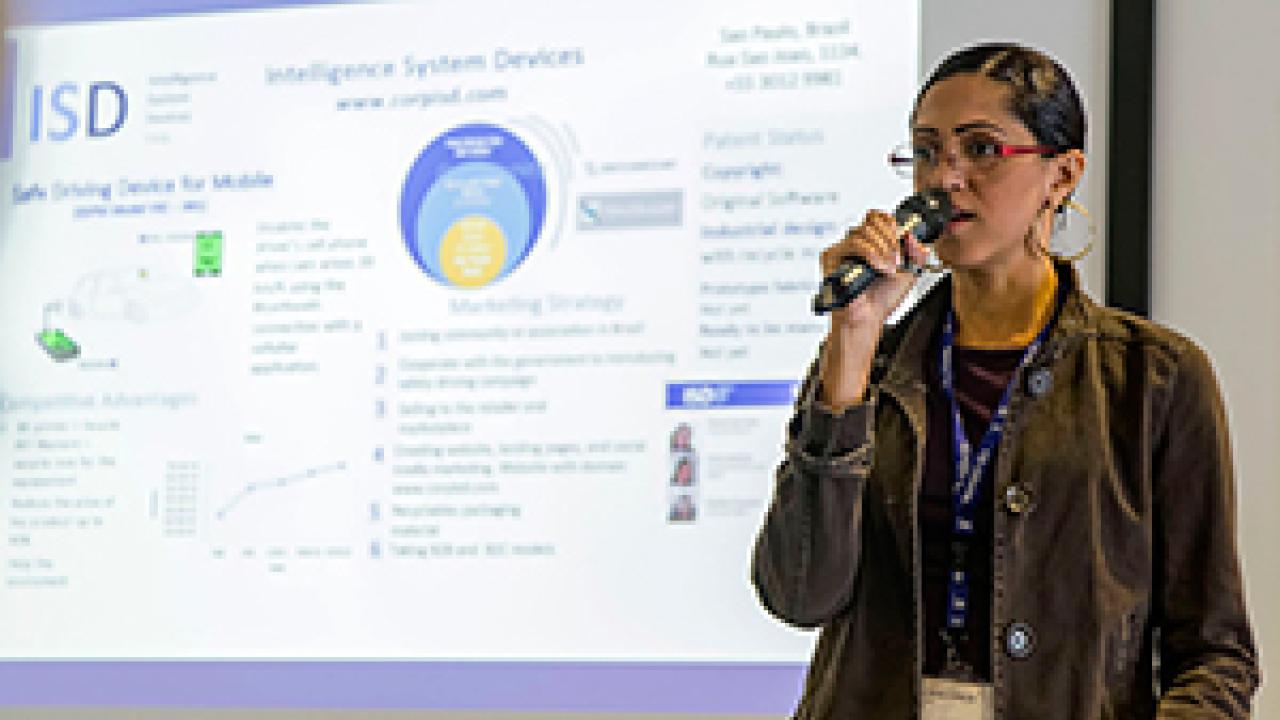
The quality of their final presentations belied the fact that participants of ICTP’s Workshop on Entrepreneurship for Scientists and Engineers had received only five days of instruction. From superabsorbent cotton alternatives to devices preventing drivers from texting, the business ideas being pitched to a team of mock investors during the workshop’s final day reflected a keen desire for commercial success.
The crash course on entrepreneurship, held from 30 March to 5 April at ICTP, covered practical knowledge and skills that academic scientists are not exposed to in graduate school, but need to launch a new business based on a scientific invention or innovation.
See photos of the workshop here.
Workshops like this help build a bridge between the laboratory and the market, says participant Maria Elena Beltran Purica, a physicist from Venezuela. Scientists sometimes want to start businesses based on inventions conceived in labs as part of or as a result of their research. They soon discover that this process requires them to consider a host of concerns and variables that do not matter in the academic world, but are crucial for launching a successful business.
This is the 10th year the workshop has been held, a program co-sponsored by ICTP, the Insititue of Physics (IOP), the American Physical Society (APS), the Optical Society (OSA), and the Institute for Electrical and Electronic Engineers (IEEE). Forty participants from 25 countries were selected to attend this year, from a pool of over several hundred. The majority of the participants were young scientists from developing countries, explains Dipali Bhatt-Chauhan, co-director of the workshop and International Relations Manager at IOP. "They are very scientifically motivated, but they lack the skills for business, like negotiating and finance. We are training and mentoring them so they understand the whole process of commercialization."
The final presentations included every part of a business pitch, sometimes built on product or service ideas that individual scientists had brought to the workshop. Judging the presentations was a panel of the weeks' speakers and workshop leaders, who acted as skeptical investors that teams would have to convince in order to be able to launch their companies. One of these faux-investors was Rosula Reyes, a Phillipine electronics engineer at Ateneo de Manila University and CEO of her own company, Blue Chip Designs, Inc. Reyes also happens to be an alumna of this workshop program, having attended as a participant in 2012.
Reyes recalls simply not being aware of some of the many concerns that entrepreneurs must deal with. "When we started, we didn't care about intellectual property," she says. "You know, when you're a passionate scientist or engineer, you simply just want to do your thing, and you don't even want to market it." Attending the workshop, she explains, taught her not only that protecting her ideas was important, but also the basics of how to do it.
"Especially when you come from a scientific background, you have the pressure of publishing," says Dipali, "and you often don't realize you have to protect your ideas." Not many universities in the developing world have an office devoted to helping deal with the intricacies of intellectual property, says Dipali, and developing-country scientists often don't realize there is a value to their ideas that needs to be protected.
Intellectual property concerns are only one of the many skills and factors covered by the workshop. Business negotiating, small-business finance, marketing, and business plan fundamentals were all touched on during the week-long course for aspiring entrepreneurs. At the end of the workshop, all the participants had a lot to think about.
"Like any other business, it's like a roller coaster ride, but the downs are the most challenging because this is usually the time to develop and implement new ideas and products," says Reyes, referring to the process of starting and running a new company. Luckily, there is a network of over 700 previous participants, like Reyes, across the world that serves as a mentoring and advice resource for new business owners. Though all of the skills required to launch a business won't be mastered in a week, this workshop helps scientists and engineers make a good start.
--Kelsey Calhoun
















